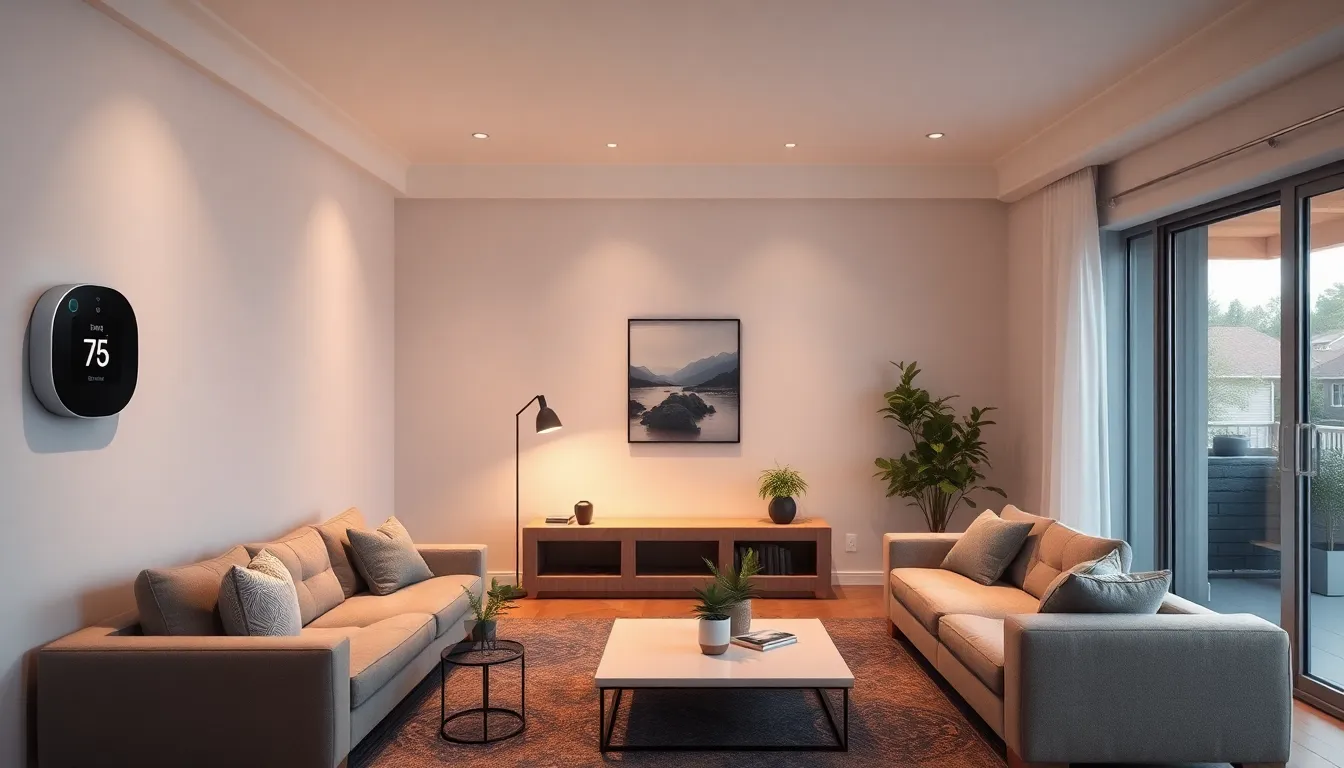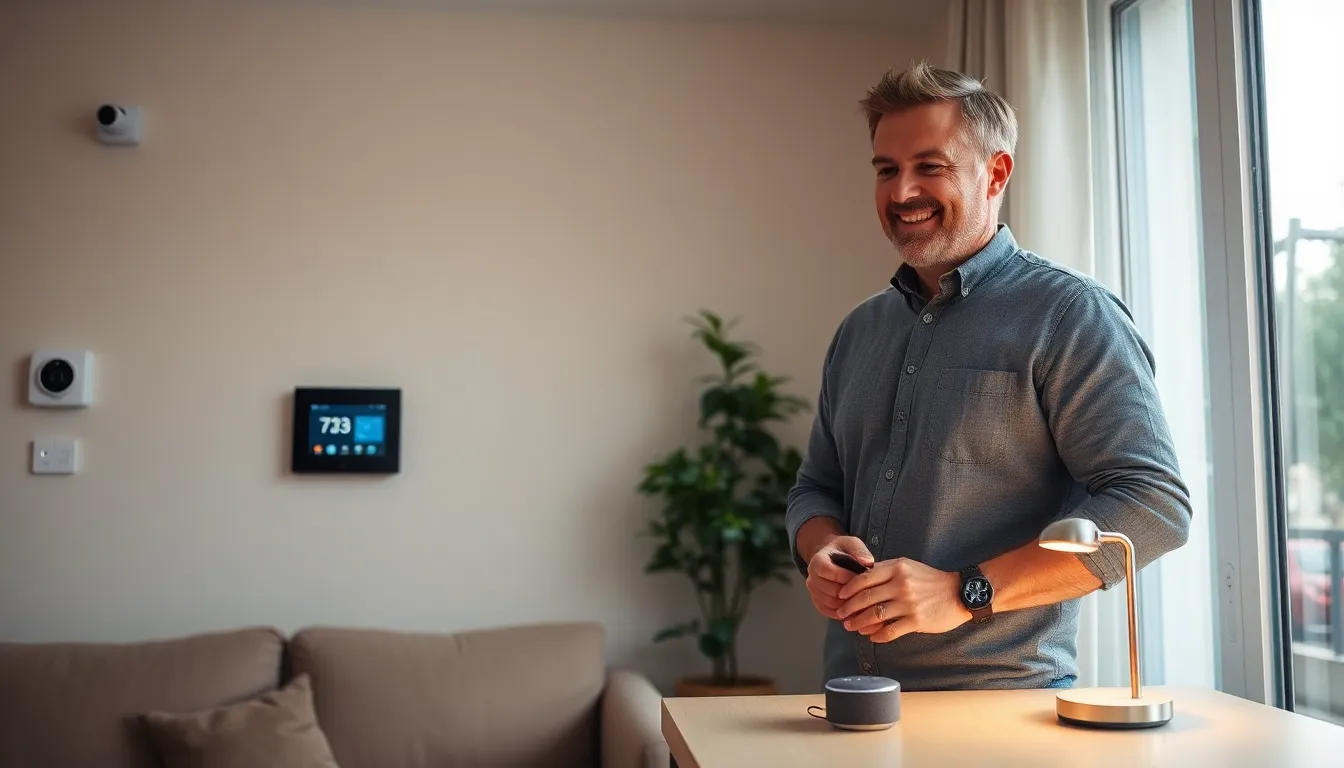Imagine walking into your home and having the lights automatically brighten to your favorite setting while your coffee brews itself. Sounds like magic, right? Welcome to the world of home automation systems, where technology meets convenience in a way that makes life not just easier but a lot more fun.
Table of Contents
ToggleWhat Is Home Automation System
Home automation systems integrate technology to enhance daily living. They allow users to control various household functions remotely or automatically. Devices connected within a home network include lights, thermostats, security cameras and appliances.
Home automation supports energy efficiency. Smart thermostats adjust heating and cooling based on user habits, while smart lights turn off when no one is present. These features reduce energy consumption and lower utility bills.
Enhancing security is another significant function. Users can monitor cameras and receive alerts about unusual activities. Remote locks allow homeowners to secure doors without being present, adding comfort and peace of mind.
Convenience plays a pivotal role in home automation systems. Users can create schedules for devices to operate at specific times. For example, coffee machines can start brewing each morning or backyard sprinklers can activate during dry conditions.
Integration of voice-activated assistants, like Alexa or Google Assistant, simplifies control. These systems allow users to manage devices through simple voice commands. By combining voice recognition with automation, daily tasks become even easier.
Customization of home settings appeals to many users. Smart blinds can adjust based on sunlight, while entertainment systems can seamlessly connect with multiple devices. Each homeowner can tailor their automation to fit personal preferences and lifestyle.
Overall, home automation systems enhance everyday living, providing comfort, security and efficiency. The rapid evolution of technology continues to expand options, making homes smarter than ever before.
Key Features of Home Automation Systems

Home automation systems offer a range of features that enhance modern living. These functionalities revolve around convenience, efficiency, and security, making homes smarter.
Smart Lighting
Smart lighting systems adjust brightness and color based on preferences or schedules. Users control lights remotely through mobile apps or voice commands. Automated setups allow lights to turn on or off at specified times, providing an added layer of security when away from home. Energy savings occur as individuals can set the lights to operate only when needed. Creating moods for different occasions becomes simple with customizable color settings. Integration with voice assistants seamlessly enhances overall control over lighting.
Climate Control
Climate control systems maintain optimal temperatures based on user habits. Smart thermostats learn daily routines and adjust heating or cooling automatically. Homeowners enjoy energy efficiency with settings that reduce power usage when no one is present. Users can remotely monitor and adjust climate settings, ensuring comfort upon arrival. Scheduling features let users prepare the environment before returning home. Beyond comfort, these systems contribute to significant energy savings over time.
Security and Surveillance
Security and surveillance features provide peace of mind for homeowners. Real-time alerts notify users about unusual activity detected by smart cameras. Remote locking mechanisms allow homeowners to secure doors from anywhere, enhancing safety. Integration with motion detectors further protects properties by triggering alerts for potential intrusions. Video footage can be accessed remotely, giving users insight into their home regardless of location. Surveillance systems not only increase security but also foster a sense of control over one’s property.
Benefits of Home Automation
Home automation systems offer significant advantages, enhancing daily routines for users.
Convenience and Comfort
Smart technology greatly improves convenience by automating tasks. Lights can switch on automatically as one enters a room, while coffee makers can start brewing at a specific time each morning. Scheduling features enable users to program devices according to personal preferences. Voice-activated assistants simplify control, allowing hands-free operation for various functions. Customized settings for smart blinds can adjust automatically based on sunlight exposure, ensuring optimal light levels throughout the day. Overall, the ease of operation elevates comfort levels within the home.
Energy Efficiency
Energy efficiency stands out as a primary advantage of home automation. Intelligent thermostats learn user behaviors, adjusting heating and cooling for optimal energy use. Smart lighting systems turn off automatically when no one is around, reducing unnecessary energy consumption. Users can monitor energy usage in real time, identifying opportunities to save on utility bills. Automated systems help limit excessive energy draw during peak times. These features collectively contribute to lower monthly expenses and a reduced carbon footprint over time.
Enhanced Security
Security represents a critical benefit of home automation. Users can monitor their properties through connected cameras, receiving alerts about suspicious activity instantly. Remote locking features enable locking or unlocking doors from anywhere, increasing safety for homeowners. Automated lighting can simulate occupancy, deterring potential intruders. Many systems offer real-time access to video footage, providing peace of mind. Options like integrating smoke detectors and carbon monoxide alarms further enhance safety measures, ensuring any issues prompt immediate notifications. Together, these technologies foster a secure living environment for families.
Popular Home Automation Technologies
Home automation relies on a variety of technologies to deliver seamless control over household systems. Prominent among these are wireless protocols and smart devices, each playing a crucial role.
Wireless Protocols
Wireless protocols enable communication between automation devices within a home. Zigbee, Z-Wave, and Wi-Fi provide distinct advantages. Zigbee operates on low power with a mesh network, allowing devices to communicate over large distances. Z-Wave focuses on reliable connections with low bandwidth, ideal for smart home applications. Wi-Fi, prevalent in most homes, offers high-speed connectivity for devices requiring significant data transfer. Bluetooth serves as another option, connecting devices over shorter ranges with ease. Each protocol supports different functionalities, accommodating diverse user needs within the home automation landscape.
Smart Devices and Sensors
Smart devices and sensors form the backbone of home automation systems. Smart thermostats regulate temperature by learning user preferences, contributing to energy savings. Security cameras provide real-time monitoring, while smart locks enhance security through remote access and notifications. Motion sensors detect movement, triggering lights or alerts, improving safety within the home. Smart lighting systems adjust brightness and color automatically, tailored to time or activity. Home assistants, such as Amazon Echo or Google Home, facilitate voice control, streamlining device management. Combining these devices leads to enhanced convenience and efficiency, making home automation an attractive choice for many homeowners.
Home automation systems represent a transformative shift in how individuals interact with their living spaces. By integrating smart technology into everyday tasks, these systems not only enhance convenience but also promote energy efficiency and security.
As technology continues to evolve, the possibilities for smart homes are expanding rapidly. Homeowners can customize their environments to suit their lifestyles while enjoying peace of mind through advanced security features.
With user-friendly interfaces and voice-activated controls, managing a smart home is easier than ever. Embracing home automation can lead to a more comfortable and efficient living experience, making it a worthwhile investment for anyone looking to upgrade their home.





